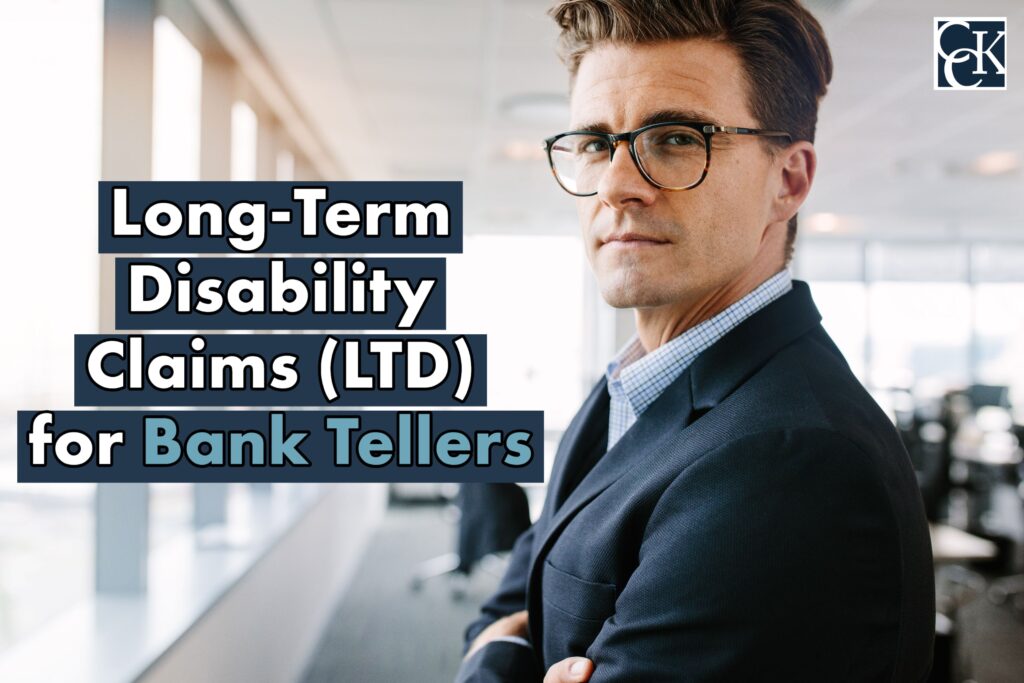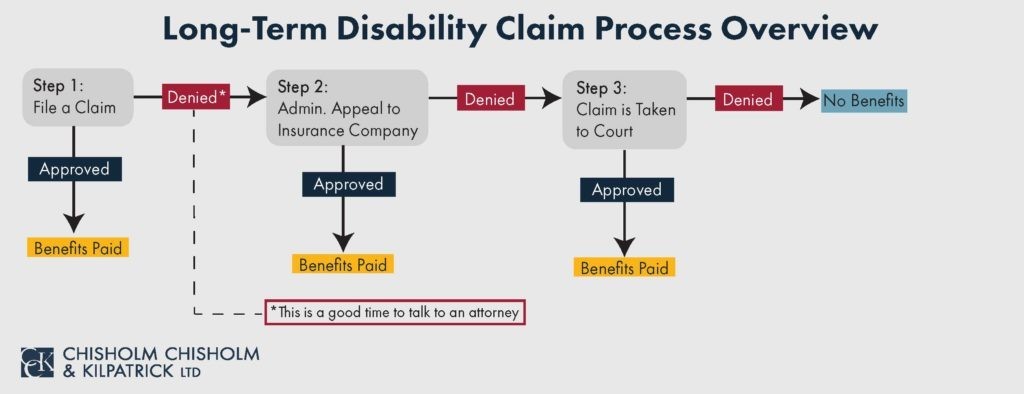Long-Term Disability (LTD) Claims for Bank Tellers

Bank tellers who develop debilitating medical conditions that prevent them from working may be eligible for long-term disability (LTD) benefits. Bank tellers handle a lot of sensitive information concerning customers’ finances. As such, they must be careful and attentive with their work. A medical condition that affects their cognitive abilities could have far-reaching ramifications. Moreover, a physical malady could make it impossible for them to arrive to work on time — or at all.
Long-term disability benefits can help protect a person’s income when they cannot work for an extended period. Yet obtaining these benefits can be complicated. Therefore, consulting an experienced LTD attorney is beneficial. Read more to see what you need to know about your long-term disability claim as a bank teller.
The Occupational Duties of Bank Tellers
There are more than 400,000 bank tellers in the United States. They form an important part of the banking and finance sector. Automated teller machines (ATMs) are daily becoming more popular and reducing the overall number of bank tellers in the country. However, it does not mitigate the need for long-term disability benefits for those bank tellers who develop a debilitating medical condition that prevents them from working.

Bank tellers are responsible for the financial transactions of customers within a bank. They must safely handle these transactions, which sometimes involve a large amount of money. Moreover, they must handle checks, money orders, traveler’s checks, and other transactions as necessary. They must also recognize opportunities to refer customers to other bank personnel, such as loan officers.
While their primary duty is to handle financial transactions, they have other duties too. These can include:
- Counting the physical money at the bank at the beginning and end of the day;
- Accepting various forms of payments throughout the day;
- Helping customers with foreign currency exchanges; and
- Make accurate records of all transactions during the day.
Moreover, if the person is a “head teller,” then they must also supervise the other tellers at the bank, which adds responsibilities, such as scheduling shifts and training new hires. Any bank teller may become a head teller, and they may also progress to being a loan officer — usually after several years of experience.
Examples of Disabilities That May Sideline a Bank Teller
As the above duties show, a disability — even a minor one — can sideline a bank teller. A bank teller must maintain their cognitive abilities to ensure that all customers’ money is handled securely. A mistake could result in missing funds — or worse.
For example, if a bank teller suffers from insomnia, then they may experience daytime sleepiness, irritability, and difficulty focusing on what they are doing. All this can impact their ability to work. Moreover, many who suffer from insomnia also suffer from anxiety and depression. If a bank teller is not properly focusing on what they are doing, then they may mix up numbers; miscount finances; mishandle a customer’s personal information; and more.
Of course, it is not only the cognitive abilities of a bank teller that are important. If a physical condition befalls a bank teller, then they may not be able to arrive to work on time; stand or sit for extended periods; or they may have to leave their station throughout the day. Moreover, a painful condition can cause a bank teller to become distracted and irritable, which can lead to mistakes.
Long-Term Disability Insurance Policies for Bank Tellers
Before you file a long-term disability claim, you must verify that you have an LTD insurance policy. Bank tellers will often have this policy through their employer, but it is possible they have bought it privately themselves.

If you believe you have such a policy through your employer, you can ask a member of human resources directly. If you have a policy, then they can provide you with your plan’s governing documents. However, if you believe you have bought one privately, then you can check your financial statements. Premium payments to an insurer indicate that you may have an LTD policy. In such a case, you may contact your insurer directly for your plan’s documents.
Once you have your plan’s documents, you need to review them thoroughly. Many issues arise from not understanding this policy and what it contains. Valuable information — such as limitations and exclusions; filing deadlines; and how to appeal a denial — is included in such policies. You will have a better sense of the coverage your policy provides, and it can help guide you when filing your claim.
Policies include a definition of disability, which is a crucial part of any claim. You will encounter one of two definitions: an “own occupation” definition and an “any occupation definition.” The own occupation definition asks whether your condition prevents you from doing your specific job, while the any occupation definition asks whether your condition prevents you from doing any job at all.
Your policy may include a “gainful component” if it is an any occupation policy. In short, the gainful component asks whether you can perform the duties of a “gainful” occupation that would pay you a certain percentage of your pre-disability earnings.
What Does a Bank Teller Need to Establish an LTD Claim?
The definition of disability located within your policy is very important for your claim. You must prove that the medical condition that is preventing you from working meets this definition. However, you first must notify your insurance company of your intent to file for benefits. To do this, you must submit a notice of claim.

After you submit the notice of claim, it is necessary to fill out the claim forms. Within the claimant statement form, you may describe your condition and how it affects you. You should not feel limited by the space your insurer gives you; attaching an additional sheet of paper is acceptable so that you may fully describe your need for benefits.
To establish your LTD claim, you must submit evidence. Some bank tellers may submit only their medical records as evidence. While these records form the primary source of evidence for many claimants, it may be necessary to submit supplemental evidence too. This evidence can include specialized reports from your doctor and witness statements from personal acquaintances.
In short, you must be able to prove that your condition is serious enough to stop you from working as a bank teller — or in any position whatsoever if you have an any occupation policy.
Can I Appeal My Insurer’s Decision If They Deny My Claim?
Yes, you have the right to appeal your insurer’s decision to deny your claim. It is possible that your insurer will deny your claim, and when they issue a denial, they will send you a letter detailing their reasoning.

This denial letter contains vital information for your appeal, namely, any specific reasons as to why they issued the denial. When you file your appeal, you should directly address these reasons. Your appeal is your chance to strengthen your claim. However, you must be cognizant of any filing deadlines for your appeal because if you miss these deadlines, you may lose your right to your benefits or your right to sue in federal court should your appeal fail.
If you have a group policy through your employer, then you must be aware of ERISA. ERISA governs most group policies. Under this law, you may not (except in rare cases) submit evidence after the appeal stage. So, if your appeal is denied, the court may only rely on whatever evidence you have on file already.
Therefore, when you submit your appeal, be sure to update any necessary evidence. You may not have to resubmit or update evidence, but a long-term disability insurance lawyer can help you ascertain the best way to move forward with your appeal to give you the best chance of receiving your benefits.
What About Social Security Disability Insurance (SSDI) Benefits?
You may qualify for Social Security Disability Insurance (SSDI) benefits as a bank teller. Generally, you are eligible for such benefits if your condition will last more than a year or result in death. Additionally, if your condition prevents you from performing any gainful occupation, you may also be eligible. However, if you are approved for SSDI benefits, this does not mean you will also be approved for LTD benefits.

The definition of disability can differ between these two types of benefits. Thus, you may qualify under one definition but not the other.
Many insurers, when you file for long-term disability benefits, also require you to file for SSDI benefits. They do this so that they may offset your benefits. If you receive approval for both types of benefits, your insurer will likely offset the total amount.
Call CCK Today for a Free Case Evaluation
We understand how difficult obtaining LTD benefits is and want to help. We have over three decades of collective experience dealing with insurance companies and know what they expect. Moreover, we will ensure that they receive all documentation and evidence before the deadlines listed within your policy.
Call CCK today at (800) 544-9144 for a free case evaluation with a member of our team. We will analyze your case and see if we can help.
About the Author
Share this Post

